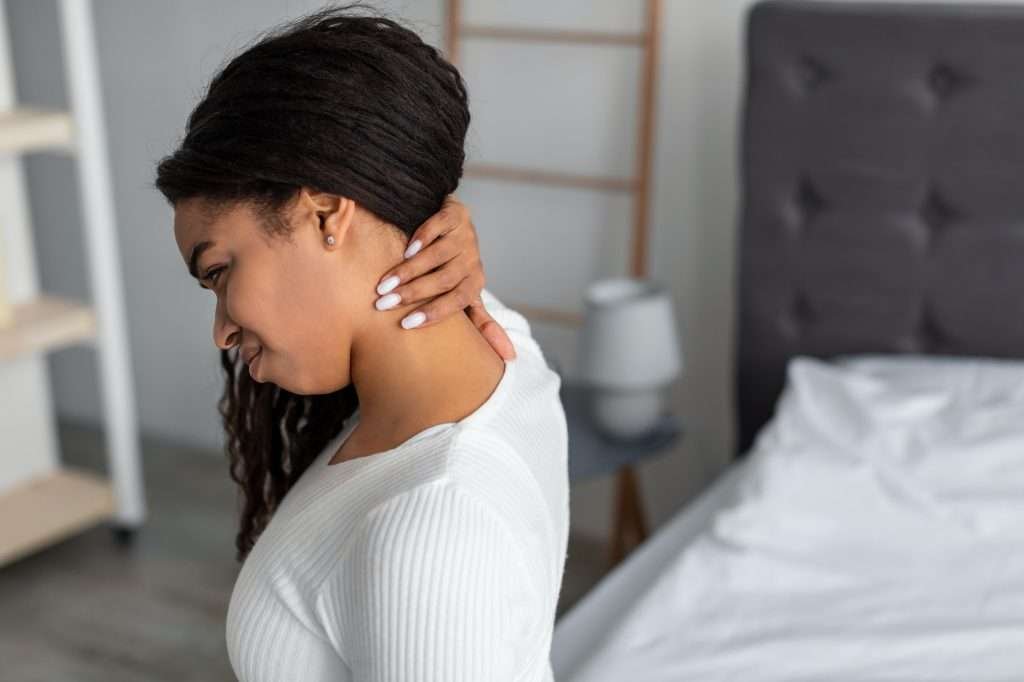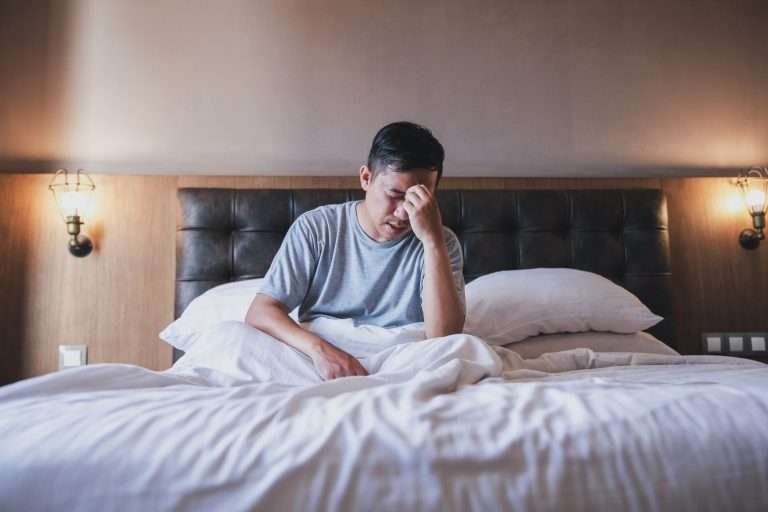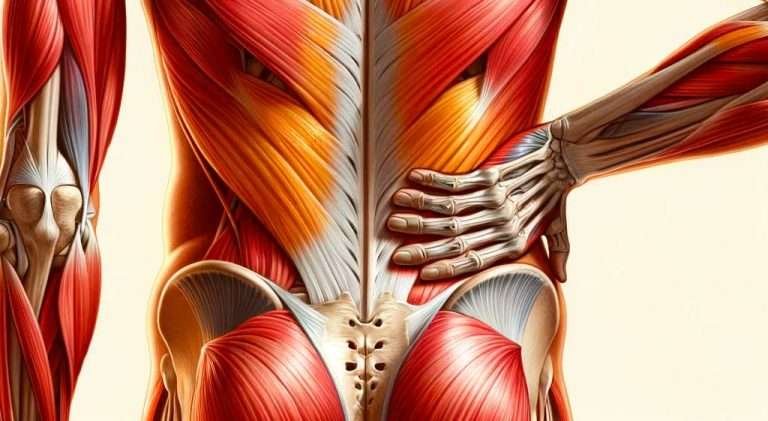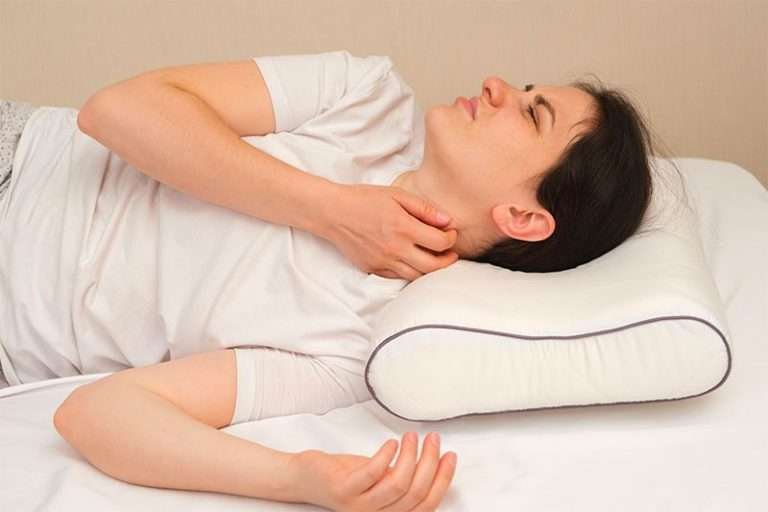
Severe Neck Pain After Sleeping?
Millions of people suffer from severe neck pain after sleeping. Millions. If you are one of them, you know how debilitating waking with neck pain every day can be. To add insult to injury, you’re pain is likely accompanied with a thumping tension headache, yes? Starting the day like this… every day… before you’ve even got out of bed is no way to live. We suffered needlessly for years before making changes.

Why Am I Waking With Neck Pain?
Occipital neuralgia aside, once we had ruled any other medical conditions (always seek medical advice if necessary) we instinctively knew the main reason for waking with severe neck pain after sleeping was what we were sleeping on… and how we were sleeping on it.
Here are the top 3 reasons for waking with severe neck pain after sleeping.

- Wrong Pillow
- Wrong Bed / Mattress
- Sleeping in the wrong position

No surprise there. So, we just replace one or both and we’ll be waking refreshed and with no pain, right?
WRONG. These are the single biggest mistakes we can make if suffering with neck pain or back pain. You’ve heard it countless times that we spend on average 26yrs of our lives in bed, so getting one or both of these critical items wrong? Do you think pain is going to get better or worse?
We would argue that our choice of beds and pillows are amongst the most important decisions we make in our lifetimes. To wake in pain, or to not wake in pain? 🤔

How to choose the right pillow for neck pain?
If medical issues have been ruled out by your medical advisor, you should not be waking with neck pain every morning. If you are, then the prime suspect may be your pillow.
The wrong pillow with ruin you, we cannot stress the importance of that statement. A pillow with any of the following characteristics will make your life miserable.


Severe Neck Pain After Sleeping
Sleeping can be a great way to relax and unwind. Unfortunately, for some people, sleeping can cause a problem: neck pain. A lot of sleepers experience this issue at one point or another in their lives, but some are much more prone than others. If you’ve been having trouble getting a good night’s sleep lately, you may not be alone. About 50% of the general population experiences neck pain at some point during their life. It tends to happen most often between the ages of 20 and 50 years old, but it may persist into later adulthood as well. Unfortunately, those that have neck pain after sleeping may not know what causes it. The condition is often attributed to poor posture when you’re lying down (which is why your bed partner might also suffer from it). Even if you aren’t aware of your own bad posture when you lie down, sleeping on your back can lead to various other issues over time. Even if there isn’t anything physically wrong with your neck when you lie down, poor sleeping habits can cause muscle tension and stress on top of that.
What is neck pain after sleeping?
Neck pain after sleeping is a condition that can occur when someone sleeps on their back. It may be caused by problems with your neck, such as arthritis, but it’s more likely to be caused by poor sleeping habits. The discomfort may vary depending on the person, but it typically consists of a dull ache or pain in the neck and shoulder area.
Causes of Neck Pain After Sleeping
While it can be difficult to figure out what causes neck pain in the first place, there are ways to alleviate this issue. One way that you can prevent your partner from sleeping in an uncomfortable position is to invest in a memory foam mattress. This type of mattress is designed for optimal spinal alignment and will help reduce the risk of neck pain after sleeping. Another option is to invest in a bed frame with a headboard. A headboard that has slats or posts that support your neck will help relieve some of the strain on your shoulders and back. If you’re still struggling with neck pain when you sleep, you may want to look into getting a cervical traction device, which can be used while you sleep. Using this device will provide relief by limiting the amount of time that you spend lying down without moving at all. The device can also help improve your posture during sleep, which is something everyone should have as part of their routine anyways!
Treatment for Neck Pain After Sleeping
If you’ve been sleeping with neck pain, your partner may not be the only one suffering. To relieve pain and tension, rolling around on your side can help. This will also help with muscle recovery from poor posture. You can also try sleeping on your back, but if that doesn’t work or you have a lot of neck pain after sleeping, then it’s worth considering using a pillow that is specifically designed for sleepers to reduce neck strain. If you do use a pillow for this purpose, make sure to check the label to ensure that it meets the requirements for preventing sleep-related neck pain.
4 Ways to Get a Better Night’s Sleep
- Sleep on your left side more often.
- Create a bedtime routine that incorporates meditation and stretching.
- Consider getting a new mattress.
- Invest in a good pillow. Different pillows can help alleviate neck strain.
Tips for Good Neck Posture While Sleeping
When you’re trying to sleep, it’s important to remember that your neck is a delicate and vulnerable area. The muscles in your neck are meant to be kept strong, but they can become weak over time when you don’t give them the proper amount of rest. One way you can avoid sleeping problems is by always getting into a comfortable position before bed. This means having your head on a pillow that’s high enough up so your chin is above the mattress and your neck isn’t bent upwards or downwards too much.
Another thing to keep in mind is that lying on your back while sleeping places pressure on these muscles and can lead to issues down the road. You should also be sure not to sleep with anything heavy or with too many pillows because it will put additional stress on those muscles when you try to turn or roll over. If you’re still experiencing some neck pain after going through these tips, talk to your doctor about what could be causing the issue.




